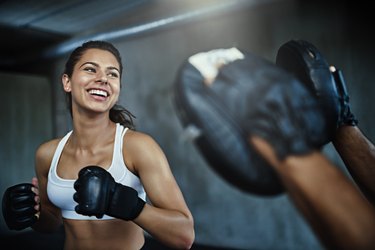
Fitness is more than skin deep. Rather than rely on looks and sizes, the skill-related components of fitness allow you to describe your physical fitness in terms of what you can do. Furthermore, skill-related fitness exercises can help you improve your performance in each area.
1. Agility Measures Ability to Adapt
Video of the Day
According to the National Academy of Sports Medicine, this skill-related component measures your ability to change direction and position of your body without losing control. The quicker you can complete these tasks, the more agility you have. Skill-related fitness tests for agility may include running through courses with cones, for example.
Video of the Day
If you want to improve your agility, the American College of Sports Medicine suggests trying a few drills:
- Battle ropes
- Quick feet up the stairs or bleachers
- Jumping rope
- Tossing a tennis ball against a wall and catching it
2. Balance for All Life Stages
Balance measures your ability to stay upright and in position, even in the face of obstacles. This remains one of the most important skill-related components of fitness in middle and advanced age. The Mayo Clinic reports that excellent balance can help prevent falls and fractures that endanger older adults. Even in childhood and early adulthood, balance is an important part of a healthy fitness routine and can improve core strength.
Yoga is one of the most popular skill-related fitness exercises for balance. People who do not want to try yoga or do not feel ready for that yet can try simpler balance exercises. For example, the Mayo Clinic recommends standing with one foot slightly raised for a few seconds, then switch feet.
3. Process and React With Coordination
Athletes with great coordination process visual information quickly and react accordingly with their hands and feet. For example, soccer players with excellent coordination can pass to one another seamlessly. Furthermore, basketball players use coordination to dribble, pass, and shoot.
Coordination skill-related fitness exercises include:
- Jumping rope
- Walk-and-talk catch
- Dribbling basketballs
- Contralateral marching
4. Speed for Every Sport
Speed is perhaps the most intuitive of the skill-related fitness components, as it measures how quickly you can complete certain tasks. One of the most common skill-related fitness tests for speed is to run and time sprints. However, you can also test your time on other tasks as well.
What type of speed you want to improve may depend on your favorite sport. For example, bicyclists and swimmers often want to increase their times in their specific sports. Furthermore, martial artists often work on increasing their hand speed to help them land more hits.
Read more: Hand Speed Exercises for Martial Arts
5. Power Measures Speed and Force
Power is the combination of your speed and strength during a given physical activity. Often, having lots of physical power means being able to generate lots of force quickly, even though you may only maintain that force for short bursts. For example, power runners do well in sprints and powerlifters have high one-rep maxes.
The infamous burpees and increasingly popular box jumps help improve power. Kettlebell exercises and heavy weightlifting can also help increase your power.
Read more: Define Strength, Power & Muscular Endurance
Bonus Skill: Reaction Time
If skill-related components of fitness were vowels, reaction time would be "y." While some fitness experts include reaction time as the sixth component, others include it with coordination. Regardless of its classification, reaction time is an important part of many athletic events.
This component measures how fast it takes for you to see or hear something and react appropriately. For example, a football receiver must see the pass coming his way and react quickly to successfully catch the ball. Furthermore, martial artists must react to their opponents' acts instantaneously.
If you want to measure your fitness on something other than your appearance, be sure to focus on these important components. Improving these skills can also help you excel in your chosen sport and live healthily in old age.
- American College of Sports Medicine: "Exercise Testing and Prescription"
- National Academy of Sports Medicine: "Building Athletic Speed, Agility and Quickness With the NSAM-PES"
- American Council on Exercise: "7 Drills to Enhance Agility"
- Mayo Clinic: Fitness Training: "Elements of a Well-Rounded Routine"
- Mayo Clinic: "Balance Exercises"